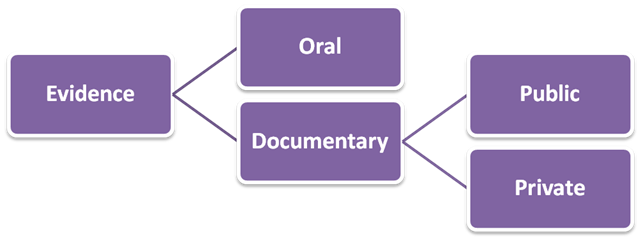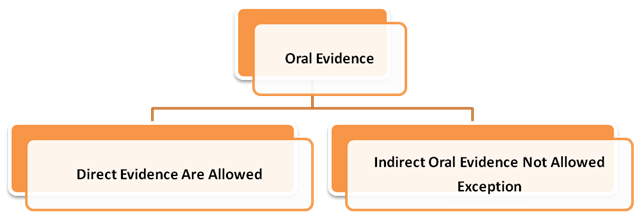
Oral evidence is defined under section 3 (under evidence head in Interpretation clause) which explains that
“All statements which the court permits or requires to be made before it by witnesses, in relation to matters of fact under inquiry, such statements are called as oral evidence.”
The term Oral in general signifies by word of mouth. ‘Oral Evidence’ literally means “The evidence, which is confined to words spoken by mouth”.
Oral Evidence also includes the statements made by people in signs and writing forms (inclusive of people who cannot speak).
Section 119 deals with Dumb witnesses
“A witness who is unable to speak may give his evidence in any other manner in which he can make it intelligible, as by writing or by signs; but such writing must be written and the signs made in open Court. Evidence so given shall be deemed to be oral evidence.”
Section 59. Proof of facts by oral evidence
All facts, except the 8A[contents of documents or electronic records], may be proved by oral evidence.
This Section lay down that, where written documents or electronic record exist, they shall be produced as being the best evidence of their own contents and no oral evidence can be adduced to prove as to what is wrong in the document or electronic record.
The contents of documents and electronic records cannot be proved by oral evidence.
It was held in Bhima Tima Dhotre v. The pioneer chemical co.that
“Documentary evidence becomes meaningless if the writer has to be called in every case to give oral evidence of its contents.
Courts in India are well aware about the fact that oral evidence is far less satisfactory than documentary one. But that in no way can be grounds for the invalidation of oral evidence. To make sure that oral evidence is not misused and does not hamper the delivery of justice, great care and caution must be exercised.
The Court must sift the evidence, separate grain from chaff and accept what it finds to be true and reject the rest.
The Broad Guidelines are as follows :-
- Oral Evidence must be consistent with the circumstantial evidence and during examination – in – chief or cross examination does not deviate from the same.
- In case the oral evidence pertains to a fact that has been seen, then it is the witness who needs to have seen the occurrence and cannot give an oral statement based on hearsay
Section – 60. Oral Evidence Must be Direct

- Exception of Direct Evidence Rule
- Res gestae (Under Section – 6)
- Conspiracy (Under Section – 10)
- Admission & Confession (Under Section – 17 to 31)
- Dying Declaration (Under Section – 32 (1))
- Evidence in the former proceeding (Under Section – 33)
- Opinion published in treatises 7. Sections 32, 33, 34 & 353

If it refers to a fact which could be seen, it must be the evidence of a witness who says who says he saw it;
If it refers to a fact which could be heard, it must be the evidence of a witness who says he heard it;
If it refers to a fact which could be perceived by any other sense or in any other manner, it must be the evidence of a witness who says he perceived it by that sense or in that manner;
If it refers to an opinion or to the grounds on which that opinion is held, it must be the evidence of the person who holds that opinion on those grounds;
Provided that the opinions of experts expressed in any treatise commonly offered for sale, and the grounds on which such opinions are held, may be proved by the production of such treatises if the author is dead or cannot be found, or has become incapable of giving evidence, or cannot be called as a witness without an amount of delay or expense which the Court regards as unreasonable;
Oral Evidence must be direct in all cases. Indirect ways or hearsay is not considered a part of direct oral evidence. The word “Direct” in all matters must mean that it is administered by any person on their own i.e through their personal knowledge and is not passed by any other person (hearsay) which on the other hand will be inadmissible.
For example: if Andu saw that Bantu is hitting Chotu. Andu will be an eyewitness to the crime scene and his testimony will be that of direct evidence.
If Andu overheard Bantu’s conversation that stated; that he is going to rob Chotu tomorrow under the bridge, Andu’s testimony will be that of direct evidence.
Amar Singh v. Chhaju Singh And Anr.
A relationship between section 50 and 60 of Indian Evidence Act has been established which says that for proving an evidence completely, two things shall be fulfilled firstly, there shall be a presence of relevant facts and those facts have been presented directly by the person who has either seen them, heard them or etc.








No comment